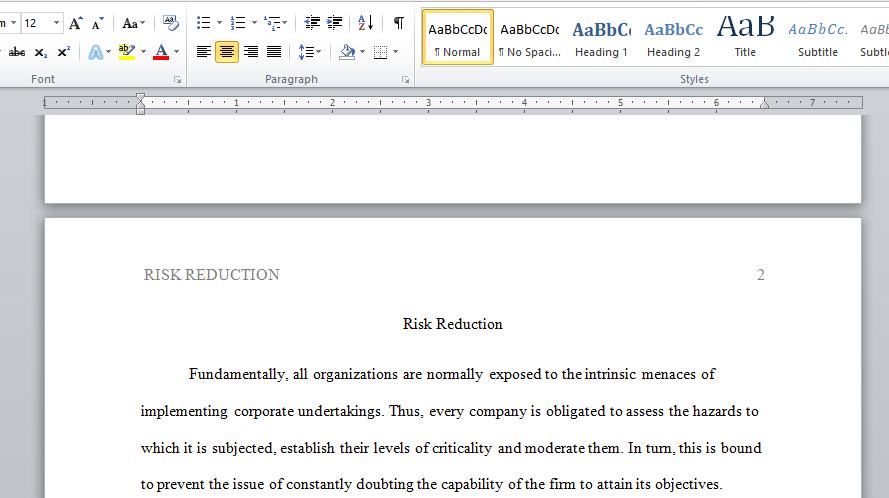Discuss risk reduction and decision making in business
Give us an example where we can balance between risk and reward in the public sector.
Here is another student’s response that includes an example:
When discussing Risk and Reward, it’s all about quality is a measure of excellence of defects and deficiencies and significant variations. Entrepreneurial means taking financial risk in hopes to make a profit, also known as enterprising. According to the “Risk Aversion and Sector of Employment” article, risk is associated with the employer in terms of taking a financial loss working for a public or private sector. Critics feel that there are too may risk within the private and or public sector when it comes to achieve organizational goals, accomplishments, and performance. Risk assessment are implemented to eliminate, reduce, and minimize the risks. The benefits of quality risk assessment are high productivity, build morale, monetary savings, and an overall positive face for the company. The public and private sector collective bargains mirror each other when it comes to economic contract negotiations and grievance procedures. The public-sector bargaining is set in place to assist and improve government agencies wages and conditions, which is also considered reward. Collective bargaining refers to economic negotiations and agreements between management and the union regarding an employer’s job benefits, working conditions, salaries, rights, training, working hours, overtime, and grievance, and compensation. The private sector bargain is not driven by politics but driven solely by the private sector union in other words the private sector can implement they’re on individual rules.
An example of balance between risk and reward would be last week article “Bootleggers, Baptist, and Political Entrepreneurs”, by Simmons, R., Yonk, R., & Thomas, D. (2011). Political entrepreneurs operate in an environment that separates cost and benefit from a change in direction or from the formation of new coalition. Risk involves potential loss of something of value, planned or unplanned. Risk can be inevitable and clear rules that define how an agency will operate are indispensable (Cohen and Emicke, 1999).
Reference
Simmons, R., Yonk, R., & Thomas, D. (2011). Bootleggers, Baptists, and political entrepreneurs:
Key players in the rational game and morality play of regulatory politics. The
Independent Review, 15(3), 367–381.
http://lib.nova.edu/183 (Links to an external site.)
Cohen, S., Eimicke, W., & Salazar, M. P. (1999, November). Public ethics and public
entrepreneurship. Paper presented at the Annual Research Meeting of the Association of
Public Policy Analysis and Management, Washington, D.C. Retrieved from
ResearchGate:
http://www.researchgate.net/
As you are reading this paragraph, there are people scouting opportunities for nefarious behavior which takes advantage of a transition to more entrepreneurial public/non-profit policies and practices — none of which was ever okay (legal, ethical, or otherwise). Give us an example of when you came across bad behavior masquerading in the name of good and how it can be corrected.
Here is an example of Last Week’s post:
Different entrepreneurship ventures have various goals. For instance, commercial entrepreneurship aims at maximizing profits while social entrepreneurship seeks to improve social value. In addition, businesses have laws and policies that govern operations and determine its performance. Entrepreneurs have an obligation to ensure their business observe the legal and ethical standards in their industry and society. The discussion documents instances where entrepreneurs utilized bad behavior to achieve organizational interests.
Tobacco companies are known for the production of cigarettes and other nicotine products. Before research determined that the substance results in cancer, cigarette companies used medical practitioners to advertise their products. Since the 1930s and 40s, these companies used doctor’s claims to assure their users the medicinal value of cigarettes. Use of doctor’s endorsement and terming cigarettes as healthy is a serious ethical and legal concern.
Research indicates that cigarette smoking may cause lung cancer. In addition, other sources document harmful effects of cigarettes on youth and expectant mothers. Health science research associates coughing and throat irritation to cigarette smoking. An advert by the American Tobacco company adopted physicians’ claims to promote their product (Blum, 2010). Another company with a similar approach was Philip Morris. Philip Morris documented the need to change one’s cigarette brand to its products to reduce irritation.
The use of such opportunities to create awareness and establish a competitive advantage is unethical. Even though the strategy may have improved sales and increased market share, it sprouts ethical concerns. Entrepreneurs are therefore required to adopt the following to enhance moral and legal behavior for their business. Set standard operating procedures for the business (Brenkert, 2009). These must document ethical and legal behavior to support business functions at all levels of the business.
References
https://www.history.com/news/
Blum, A. (2010). When “More doctors smoked Camels” Cigarette advertising in the journal. Social Medicine, 5(2), 114-122.
Brenkert, G. G. (2009). Innovation, rule breaking and the ethics of entrepreneurship. Journal of Business Venturing, 24(5), 448-464.
Answer preview :

Word limit : 267
